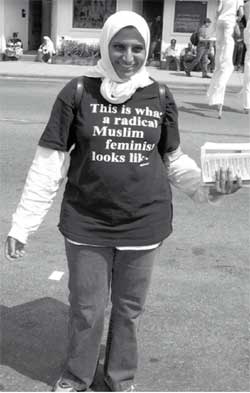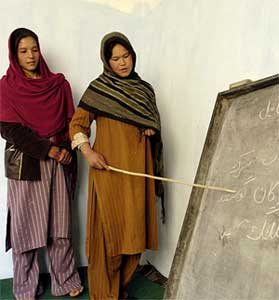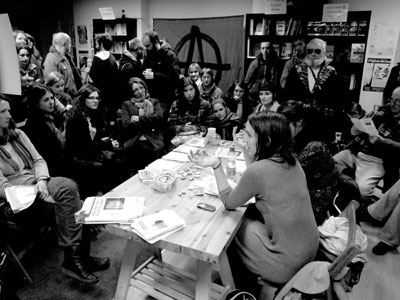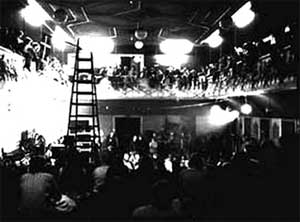Over 30 years of anarchist writing from Ireland listed under hundreds of topics
Feminism
Radical Women of the IWW
Donal Fallon profiles some of the women who played a large part in the illustrious history of the Industrial Workers of the World.
Feminism in the Muslim World
 Sevinc Karaca, a Turkish anarchist and feminist, describes the fine line that Muslim women must navigate between Islam and the West. "In all Muslim countries, women had to wait until the 1970s and 1980s for a feminist movement that questioned the practise of religion and its role in the oppression of women. As Feminists in the West beat around the bush with an air of multi-culturalist political correctness and go out of their way to show respect for exotic religions, there is a growing number of feminists in countries like Turkey and Iran and among the diaspora in non- Muslim countries whose policies and strategies for feminism do not take the route of Western Liberal Feminism. The majority of feminist ideologies and activism in the developed world today do not address and support the struggle of their Muslim comrades openly, directly or sufficiently."
Sevinc Karaca, a Turkish anarchist and feminist, describes the fine line that Muslim women must navigate between Islam and the West. "In all Muslim countries, women had to wait until the 1970s and 1980s for a feminist movement that questioned the practise of religion and its role in the oppression of women. As Feminists in the West beat around the bush with an air of multi-culturalist political correctness and go out of their way to show respect for exotic religions, there is a growing number of feminists in countries like Turkey and Iran and among the diaspora in non- Muslim countries whose policies and strategies for feminism do not take the route of Western Liberal Feminism. The majority of feminist ideologies and activism in the developed world today do not address and support the struggle of their Muslim comrades openly, directly or sufficiently."
On women and ‘Liberation’ in Afghanistan
 A decade ago the US First Lady Mrs. Bush’s went on the radio in the first solitary address of any president’s wife in U.S. history to dare all decent people of the world to join the US and its allies in freeing the women of Afghanistan from the “brutal terrorism” of Islamic fundamentalism. Almost ten years later this explanation continues, Time Magazine weighed in with its July 2010 headline, What Happens If We Leave Afghanistan. This story about ‘freeing’ Afghan women only became politically expedient when the aim of capturing Osama bin Laden and al-Qaeda proved harder to do than anticipated. So the Bush Administration asked Laura to polish off that erstwhile story of the savage East in need of an altruistic West, and they cleverly reinvented orientalism in the guise of “the woman question.”
A decade ago the US First Lady Mrs. Bush’s went on the radio in the first solitary address of any president’s wife in U.S. history to dare all decent people of the world to join the US and its allies in freeing the women of Afghanistan from the “brutal terrorism” of Islamic fundamentalism. Almost ten years later this explanation continues, Time Magazine weighed in with its July 2010 headline, What Happens If We Leave Afghanistan. This story about ‘freeing’ Afghan women only became politically expedient when the aim of capturing Osama bin Laden and al-Qaeda proved harder to do than anticipated. So the Bush Administration asked Laura to polish off that erstwhile story of the savage East in need of an altruistic West, and they cleverly reinvented orientalism in the guise of “the woman question.”
Successful International Women’s Day Celebration in Cork
 The Workers Solidarity Movement (WSM) in Cork was delighted by the success of the Douglas Street Community Celebration of International Women’s Day on Monday, 8th March. The day comprised of fifty free, open events involving poetry, music, workshops, speakers, fortune tellers, performance art, a community dinner, knitting club, films, a community art exhibition and much more. The celebration ran from 10am to midnight at Solidarity Books and many other venues on and around Douglas Street.
The Workers Solidarity Movement (WSM) in Cork was delighted by the success of the Douglas Street Community Celebration of International Women’s Day on Monday, 8th March. The day comprised of fifty free, open events involving poetry, music, workshops, speakers, fortune tellers, performance art, a community dinner, knitting club, films, a community art exhibition and much more. The celebration ran from 10am to midnight at Solidarity Books and many other venues on and around Douglas Street.
Martha Ackelsburg on the Mujeres Libres audio
Martha is a US anarchist feminist and author of the classic anarchist text 'Free women of Spain'. In her talk at the 2009 Dublin anarchist bookfair she discusses Mujures Libres, the movement of revolutionary anarchist women that arose during the Spanish revolution of 1936.
Martha Ackelsburg - anarchist feminist on Mujeres Libres / Free Women of the Spanish Revolution by Workers Solidarity on Mixcloud
Capitalism and the exploitation of women
When the Irish constitution was unveiled in 1937 it set out a special place for women within the home. In Ireland as elsewhere ‘women’s life within the home’ has to a large extent been characterized by long hours of thankless drudgery. While the struggles of Irish women for greater liberties during the last century have improved our lives in many ways, the drudgery of housework remains thankless and the workplace has not brought the liberation that certain feminists promised. As anarchists see it, this is because as long as we live in a capitalist society women (or men) can never be meaningfully liberated.
Archive of anarchist educationals on Women's Issues to 2008
The following is a list of talks given to WSM branches and public meetings on women's issues and feminism up to 2008.
Why there is an International Women’s Day
 Every year we celebrate International Women’s Day on March 8th. This goes back to 1910, when an international conference of socialist women decided that 'women the world over set aside a particular day each year to remember women and their struggles.'
Every year we celebrate International Women’s Day on March 8th. This goes back to 1910, when an international conference of socialist women decided that 'women the world over set aside a particular day each year to remember women and their struggles.'
Dublin: Feminist Walking Tour
What? Feminist Walking Tour
When? IWD Sat March 8th, 2.30pm
Where? Meet at Stephen's Green Arch
Why? Education, Celebration, Visibility, Solidarity, Fun!
Is Equal Pay Possible?
You thought that equal pay had been sorted years ago? Well, according to the United Nations, women and girls do two thirds of the world’s work for 5% of the income. Of the world’s 550 million working poor, those unable to lift themselves and their families above the $1 per day threshold, 330 million, or 60%, are women.

